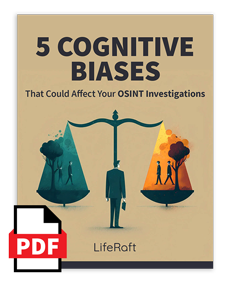
Contents
Working in open-source intelligence means you always have to learn new things. But you probably already knew that – which is why you're searching for new OSINT podcasts and resources to stay at the top of your game.
Things evolve too quickly. The amount of public data out there keeps growing. Never mind the increasing number of tools to help analysts during their investigations.
It takes a consistent effort to stay current.
So if you want to keep up with the changing world of intelligence, OSINT podcasts are your new best friend.
Not only are they an easy way to stay informed. But the conversations can also inspire listeners to try out new tactics and techniques.
And as the open-source intelligence community has grown in recent years, so too has the number of high-quality podcasts.
So to help you out, we put together a list of our seven favorite OSINT podcasts. And for each series, we’ve also highlighted some top episodes new listeners should check out first.
Now with that preamble out of the way, let’s dive in!
Learn More: 5 Cognitive Biases That Could Affect Your OSINT Investigations
The Top 7 OSINT Podcasts
- The Privacy, Security, & OSINT Show
- The OSINT Curious Project
- The World of Intelligence
- Breadcrumbs
- The Business of Intelligence
- Talking Threat Intelligence
- Needle Stack
1. The Privacy, Security, & OSINT Show
Michael Bazzell is an investigator, cybersecurity expert, and perhaps most interestingly, he makes people disappear.
Bazzell and his team help clients conduct online exposure assessments to minimize their digital footprints. His weekly podcast offers an insider’s view of privacy, digital security, and open-source intelligence.
Recent topics include radio monitoring, the impact of COVID on privacy, and defensive OSINT techniques.
Some of our favorite episodes:
2. The OSINT Curious Project
The OSINT Curious Project aims to generate and foster interest in open source intelligence. And the site has long served as a hub for the latest news in the community.
Each episode, the team interviews veteran OSINT practitioners, discussing their tactics and techniques as well as how they broke into the field. You’ll be inspired and motivated by the stories guests share about their tradecraft.
Some of our favorite episodes:
- Interview with Tokyo (@Tokyo_v2)
- Interview with John Marquee (@john_marquee)
- What do you need to become an intermediate OSINTer?
3. The World of Intelligence
Janes delivers open-source intelligence for government and defense industry clients.
In their podcast, they explore the intersection between OSINT and national security. And from time to time, the team breaks down interesting topics in the realm of defense and geopolitics as well.
Recent episodes include a deep dive into the incel community, the power of geography in international relations, and the role of OSINT in the Russia/Ukraine conflict.
Some of our favorite episodes:
- Russia/Ukraine - Coming of Age for OSINT?
- The Power of Geography: A conversation with Tim Marshall
- An introduction to the incel community with Naama Kates
4. Breadcrumbs
If you love OSINT, then you probably know about Trace Labs.
This non-profit organization provides crowdsourced intelligence to help find missing people. They do this by setting up capture the flag competitions, where teams score points by scouring the web for relevant information.
On their new series Breadcrumbs, the Trace Labs team explores tools, topics, and techniques related to OSINT collection. If you want to apply your OSINT skills for good, you need to check this podcast out.
Recent episodes include a deep dive into creating sock puppet accounts, conducting OSINT on LinkedIn, and an overview of new social media platforms.
Some of our favorite episodes:
- Understanding New Social Media Platforms with Jake Creps
- OSINT for Job Seekers
- Everyday OSINT with Rae Baker
5. The Business of Intelligence
Last year, friends of LifeRaft Michael Mallard and Ryan Long launched The Business of Intelligence podcast.
Each month, the duo explores how intelligence serves corporate decision-makers. They break down what works and what doesn’t, as well as how OSINT can help businesses navigate a changing world.
Recent topics include how to enhance a corporate intelligence program, advice on building better relationships with clients, and tips for breaking into the field.
If you work in private-sector intelligence, then you need to check this show out.
Some of our favorite episodes:
- How to Break Into the Field of Private Sector Intelligence
- How to Take a Private Sector Intelligence Program From Good to Great
- Protecting Your Business From Disinformation
6. Talking Threat Intelligence
Since OSINT is our bread and butter, we hope you don’t mind us adding our very own Talking Threat Intelligence to the list.
Every other week, the series invites guests to unpack issues from the world of physical security. And, of course, threat intelligence is a consistent theme.
Recent episodes include OSINT for executive protection, creating more actionable threat intel, and networking your way into the security industry.
Some of our most popular episodes:
- The Grayman School of Celebrity Protection: Jerry Heying, CPP, PPS, CST
- Accidental Insider Threats: Suofagha Kiakubu
- OSINT to Combat Digital Disinformation: Buddy Jericho
- Creating More Actionable Threat Intelligence: Mike Evans MSyI M.ISRM AMBCI
- Demonstrating the ROI of Your Physical Security Program: Phil Harris
7. Needle Stack
Earlier this year, our friends at Authentic8 launched the Needle Stack podcast.
Each week, tech industry veteran Jeff Phillps and former White House CISO Matt Ashburn chat about the latest news, tools, and techniques from around the world of OSINT.
This podcast stands out for its deep dives into operational security when conducting open-source research. Conversations often focus on hiding your digital footprints online.
Some of our favorite episodes:
- What’s in your digital fingerprint
- VPNs, Incognito, free Wi-Fi, oh my!
- Know thyself, disguise thyself
Wrapping It Up on OSINT Podcasts
The amount of content covering the world of open-source intelligence keeps growing. For that reason, many other OSINT podcasts could (and probably should) have made this list.
That said, the channels above provide plenty of resources to get started. Go on a following spree and start adding these series wherever you listen to podcasts.
That will help you go a long way towards becoming a better analyst.

